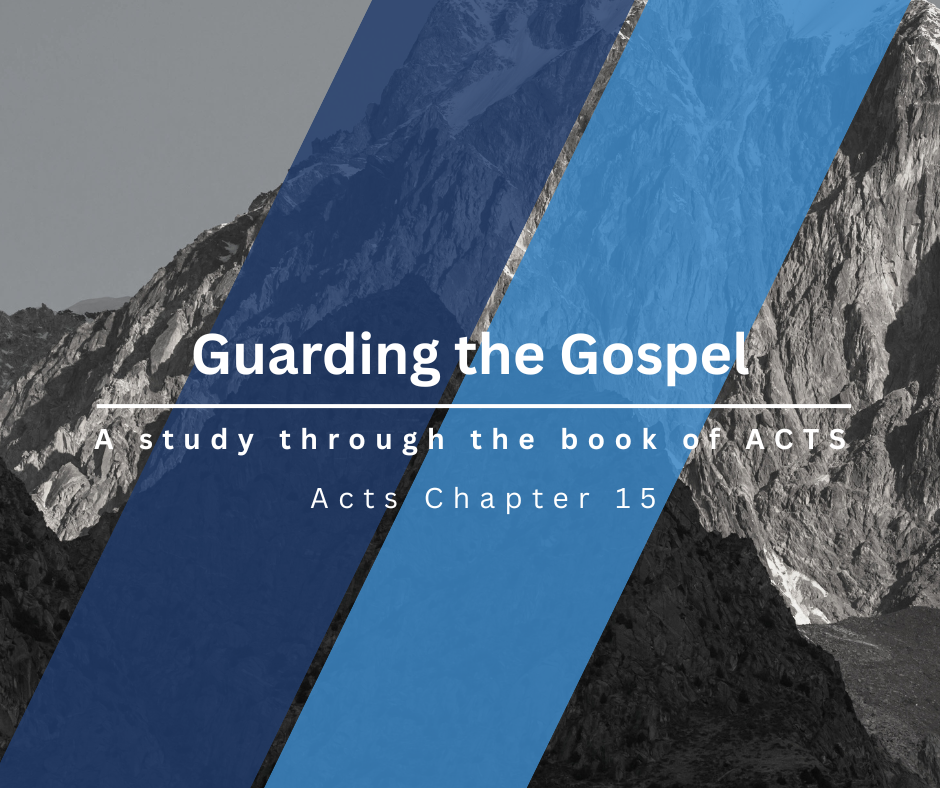When Adding to the Gospel Creates Barriers to Faith
There are a lot of meetings in church life—business meetings, committee meetings, planning meetings—but Acts 15 records the most important church meeting in history. What happened in that gathering shaped the future of Christianity and ensured that the gospel would remain accessible to every person, everywhere.
The Crisis in Antioch
As we’ve been walking through the book of Acts in our CORE series, we’ve seen the gospel expand from Jerusalem to the ends of the earth. In Acts 15, the story centers on the church in Antioch, located in what’s now modern-day Turkey, in the region of Galatia. Antioch was the first Gentile church—a place full of diversity and missionary zeal.
But when Paul and Barnabas returned home from their missionary journey, they found a serious problem. A group of men from Judea had arrived preaching a false message. These men, known as Judaizers, weren’t denying Jesus, but they were adding to Him.
Their message sounded spiritual: “Yes, believe in Jesus—but make sure you’re circumcised first and keep the law of Moses.” In other words, you have to become Jewish before you can become Christian. It was subtle, but deadly.
Why Circumcision?
In the Old Testament, God commanded His people to be different—to be holy. Circumcision was a physical mark that reminded Israel of their calling to live according to God’s law. But there was a problem: no one could actually keep that law perfectly.
So God sent His Son, Jesus, who didn’t just follow the law—He fulfilled it. He lived a perfect, sinless life, and then took our place on the cross. The One who was innocent became guilty so that we who are guilty could be declared innocent before God. That’s the gospel.
Through Christ, the mark of belonging changed. We no longer need an outward sign on our bodies; now, we have an inward transformation in our hearts. Circumcision gave way to baptism, the new symbol of our identity in Christ—buried with Him, raised to new life.
When Legalism Creeps In
When Paul and Barnabas heard what was happening in Antioch, they “had no small debate” with these teachers—in other words, they blew a gasket. They understood that if the church didn’t deal with this distortion quickly, the gospel itself would be at risk. So the leaders gathered in Jerusalem for a massive church meeting—the first church council—to settle the issue once and for all.
At the heart of their discussion was one question: Is Jesus enough? Peter stood up and said, “Why are you putting God to the test by placing a yoke on the neck of the disciples that neither our fathers nor we have been able to bear? … We believe that we will be saved through the grace of the Lord Jesus, just as they will.” That’s the heart of the gospel: grace alone.
Adding to the Gospel Leads to Hopelessness
1) Legalism Always Ends in Despair
Legalism is trying to earn God’s approval through human effort. It’s saying, “Jesus isn’t enough—I have to do more.” The Judaizers probably thought they were protecting the gospel, but in reality, they were poisoning it. When grace becomes performance, the gospel stops sounding like good news and starts feeling like bad math. You’ll never feel like you measure up, and you’ll live in constant fear of falling short.
2) False Gospels Create Defeated People
Many people don’t walk away from church because they hate Jesus. They walk away because they’re exhausted trying to earn Him. When you add to the gospel, you’re not making it stronger—you’re making it heavier. It’s like telling a drowning man, “I’ll throw you a life preserver after you learn to swim.” When we make people earn what Jesus already paid for, we don’t draw them to Christ—we drive them away.
3) Religion vs. the Gospel
| Religion Says… | The Gospel Says… |
|---|---|
| Obey, then you are accepted. | You are accepted, now obey. |
| I obey to earn God’s love. | I obey because I already have God’s love. |
| I serve to get something from God. | I serve because I’ve already received Jesus. |
| My identity is in what I do for God. | My identity is in what Jesus did for me. |
| My failure means God will reject me. | My failure is why Jesus came after me. |
| I follow rules to prove I’m righteous. | I follow Jesus because He made me righteous. |
| God blesses me when I’m good. | God is good even when I’m not. |
| My worth depends on my performance. | My worth depends on Christ’s perfection. |
| I fear punishment. | I rest in forgiveness. |
Bottom line: Religion says, “Try harder.” The gospel says, “Trust deeper.” The gospel doesn’t say, “Behave and be saved.” It says, “Believe—and be changed.”
Keeping the Gospel Pure
When the early church gathered, they didn’t rely on emotions or opinions. They anchored their decision in Scripture. James, the half-brother of Jesus, stood up and quoted from Amos 9 to show that God had always planned to save the Gentiles. The church was guided by the Spirit but grounded in the Word. That’s still our calling today.
We must ask: Do we make it easy for people who don’t know Jesus to come to Him—or do we make it hard? Do we add requirements about how someone should look, act, or behave before they can be welcomed into the family of God? The gospel is simple and powerful: Jesus is enough.
Living in the Freedom of Grace
The greatest danger isn’t only adding rules for others—it’s adding them for ourselves. Many believers live weighed down by the feeling that they’re “not good enough” for God. But friend, if you’ve trusted in Christ, there is no condemnation for you (Romans 8:1). You don’t have to earn what Jesus already purchased.
“If God is for us, who can be against us?” (Romans 8:31)
You are fully loved, completely accepted, and forever secure—not because of what you’ve done, but because of what Jesus has done for you.
Reflection & Prayer
- Am I making it easier or harder for others to know Jesus through my words and actions?
- Have I been trying to earn what Christ has already freely given?
- How can I show others that Christianity is about surrender to Jesus, not behavior modification?
“For by grace you have been saved through faith. And this is not your own doing; it is the gift of God.” — Ephesians 2:8













